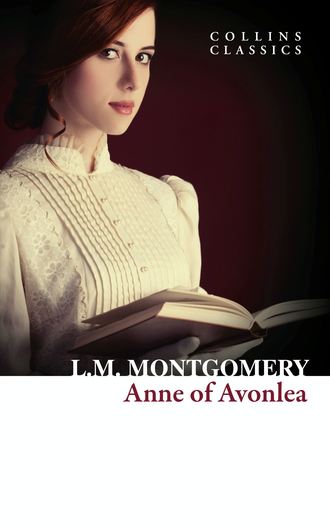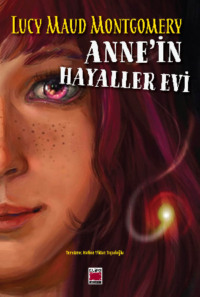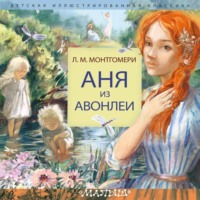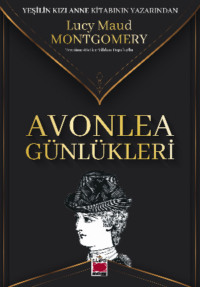
Полная версия
Anne of Avonlea
Davy behaved quite well at first, being occupied in casting covert glances at all the small boys within view and wondering which was Paul Irving. The first two hymns and the Scripture reading passed off uneventfully. Mr. Allan was praying when the sensation came.
Lauretta White was sitting in front of Davy, her head slightly bent and her fair hair hanging in two long braids, between which a tempting expanse of white neck showed, encased in a loose lace frill. Lauretta was a fat, placid-looking child of eight, who had conducted herself irreproachably in church from the very first day her mother carried her there, an infant of six months.
Davy thrust his hand into his pocket and produced … a caterpillar, a furry, squirming caterpillar. Marilla saw and clutched at him but she was too late. Davy dropped the caterpillar down Lauretta’s neck.
Right into the middle of Mr. Allan’s prayer burst a series of piercing shrieks. The minister stopped appalled and opened his eyes. Every head in the congregation flew up. Lauretta White was dancing up and down in her pew, clutching frantically at the back of her dress.
“Ow … mommer … mommer … ow … take it off … ow … get it out … ow … that bad boy put it down my neck … ow … mommer … it’s going further down … ow … ow … ow … .”
Mrs. White rose and with a set face carried the hysterical, writhing Lauretta out of church. Her shrieks died away in the distance and Mr. Allan proceeded with the service. But everybody felt that it was a failure that day. For the first time in her life Marilla took no notice of the text and Anne sat with scarlet cheeks of mortification.
When they got home Marilla put Davy to bed and made him stay there for the rest of the day. She would not give him any dinner but allowed him a plain tea of bread and milk. Anne carried it to him and sat sorrowfully by him while he ate it with an unrepentant relish. But Anne’s mournful eyes troubled him.
“I s’pose,” he said reflectively, “that Paul Irving wouldn’t have dropped a caterpillar down a girl’s neck in church, would he?”
“Indeed he wouldn’t,” said Anne sadly.
“Well, I’m kind of sorry I did it, then,” conceded Davy. “But it was such a jolly big caterpillar … I picked him up on the church steps just as we went in. It seemed a pity to waste him. And say, wasn’t it fun to hear that girl yell?”
Tuesday afternoon the Aid Society met at Green Gables. Anne hurried home from school, for she knew that Marilla would need all the assistance she could give. Dora, neat and proper, in her nicely starched white dress and black sash, was sitting with the members of the Aid in the parlor, speaking demurely when spoken to, keeping silence when not, and in every way comporting herself as a model child. Davy, blissfully dirty, was making mud pies in the barnyard.
“I told him he might,” said Marilla wearily. “I thought it would keep him out of worse mischief. He can only get dirty at that. We’ll have our teas over before we call him to his. Dora can have hers with us, but I would never dare to let Davy sit down at the table with all the Aids here.”
When Anne went to call the Aids to tea she found that Dora was not in the parlor. Mrs. Jasper Bell said Davy had come to the front door and called her out. A hasty consultation with Marilla in the pantry resulted in a decision to let both children have their teas together later on.
Tea was half over when the dining room was invaded by a forlorn figure. Marilla and Anne stared in dismay, the Aids in amazement. Could that be Dora … that sobbing nondescript in a drenched, dripping dress and hair from which the water was streaming on Marilla’s new coin-spot rug?
“Dora, what has happened to you?” cried Anne, with a guilty glance at Mrs. Jasper Bell, whose family was said to be the only one in the world in which accidents never occurred.
“Davy made me walk the pigpen fence,” wailed Dora. “I didn’t want to but he called me a fraid-cat. And I fell off into the pigpen and my dress got all dirty and the pig runned right over me. My dress was just awful but Davy said if I’d stand under the pump he’d wash it clean, and I did and he pumped water all over me but my dress ain’t a bit cleaner and my pretty sash and shoes is all spoiled.”
Anne did the honors of the table alone for the rest of the meal while Marilla went upstairs and redressed Dora in her old clothes. Davy was caught and sent to bed without any supper. Anne went to his room at twilight and talked to him seriously … a method in which she had great faith, not altogether unjustified by results. She told him she felt very badly over his conduct.
“I feel sorry now myself,” admitted Davy, “but the trouble is I never feel sorry for doing things till after I’ve did them. Dora wouldn’t help me make pies, cause she was afraid of messing her clo’es and that made me hopping mad. I s’pose Paul Irving wouldn’t have made his sister walk a pigpen fence if he knew she’d fall in?”
“No, he would never dream of such a thing. Paul is a perfect little gentleman.”
Davy screwed his eyes tight shut and seemed to meditate on this for a time. Then he crawled up and put his arms about Anne’s neck, snuggling his flushed little face down on her shoulder.
“Anne, don’t you like me a little bit, even if I ain’t a good boy like Paul?”
“Indeed I do,” said Anne sincerely. Somehow, it was impossible to help liking Davy. “But I’d like you better still if you weren’t so naughty.”
“I … did something else today,” went on Davy in a muffled voice. “I’m sorry now but I’m awful scared to tell you. You won’t be very cross, will you? And you won’t tell Marilla, will you?”
“I don’t know, Davy. Perhaps I ought to tell her. But I think I can promise you I won’t if you promise me that you will never do it again, whatever it is.”
“No, I never will. Anyhow, it’s not likely I’d find any more of them this year. I found this one on the cellar steps.”
“Davy, what is it you’ve done?”
“I put a toad in Marilla’s bed. You can go and take it out if you like. But say, Anne, wouldn’t it be fun to leave it there?”
“Davy Keith!” Anne sprang from Davy’s clinging arms and flew across the hall to Marilla’s room. The bed was slightly rumpled. She threw back the blankets in nervous haste and there in very truth was the toad, blinking at her from under a pillow.
“How can I carry that awful thing out?” moaned Anne with a shudder. The fire shovel suggested itself to her and she crept down to get it while Marilla was busy in the pantry. Anne had her own troubles carrying that toad downstairs, for it hopped off the shovel three times and once she thought she had lost it in the hall. When she finally deposited it in the cherry orchard she drew a long breath of relief.
“If Marilla knew she’d never feel safe getting into bed again in her life. I’m so glad that little sinner repented in time. There’s Diana signaling to me from her window. I’m glad … I really feel the need of some diversion, for what with Anthony Pye in school and Davy Keith at home my nerves have had about all they can endure for one day.”
CHAPTER 9
A Question of Color
“That old nuisance of a Rachel Lynde was here again today, pestering me for a subscription towards buying a carpet for the vestry room,” said Mr. Harrison wrathfully. “I detest that woman more than anybody I know. She can put a whole sermon, text, comment, and application, into six words, and throw it at you like a brick.”
Anne, who was perched on the edge of the veranda, enjoying the charm of a mild west wind blowing across a newly ploughed field on a gray November twilight and piping a quaint little melody among the twisted firs below the garden, turned her dreamy face over her shoulder.
“The trouble is, you and Mrs. Lynde don’t understand one another,” she explained. “That is always what is wrong when people don’t like each other. I didn’t like Mrs. Lynde at first either; but as soon as I came to understand her I learned to.”
“Mrs. Lynde may be an acquired taste with some folks; but I didn’t keep on eating bananas because I was told I’d learn to like them if I did,” growled Mr. Harrison. “And as for understanding her, I understand that she is a confirmed busybody and I told her so.”
“Oh, that must have hurt her feelings very much,” said Anne reproachfully. “How could you say such a thing? I said some dreadful things to Mrs. Lynde long ago but it was when I had lost my temper. I couldn’t say them deliberately.”
“It was the truth and I believe in telling the truth to everybody.”
“But you don’t tell the whole truth,” objected Anne. “You only tell the disagreeable part of the truth. Now, you’ve told me a dozen times that my hair was red, but you’ve never once told me that I had a nice nose.”
“I daresay you know it without any telling,” chuckled Mr. Harrison.
“I know I have red hair too … although it’s much darker than it used to be … so there’s no need of telling me that either.”
“Well, well, I’ll try and not mention it again since you’re so sensitive. You must excuse me, Anne. I’ve got a habit of being outspoken and folks mustn’t mind it.”
“But they can’t help minding it. And I don’t think it’s any help that it’s your habit. What would you think of a person who went about sticking pins and needles into people and saying, ‘Excuse me, you mustn’t mind it … it’s just a habit I’ve got.’ You’d think he was crazy, wouldn’t you? And as for Mrs. Lynde being a busybody, perhaps she is. But did you tell her she had a very kind heart and always helped the poor, and never said a word when Timothy Cotton stole a crock of butter out of her dairy and told his wife he’d bought it from her? Mrs. Cotton cast it up to her the next time they met that it tasted of turnips and Mrs. Lynde just said she was sorry it had turned out so poorly.”
“I suppose she has some good qualities,” conceded Mr. Harrison grudgingly. “Most folks have. I have some myself, though you might never suspect it. But anyhow I ain’t going to give anything to that carpet. Folks are everlasting begging for money here, it seems to me. How’s your project of painting the hall coming on?”
“Splendidly. We had a meeting of the AVIS last Friday night and found that we had plenty of money subscribed to paint the hall and shingle the roof too. Most people gave very liberally, Mr. Harrison.”
Anne was a sweet-souled lass, but she could instill some venom into innocent italics when occasion required.
“What color are you going to have it?”
“We have decided on a very pretty green. The roof will be dark red, of course. Mr. Roger Pye is going to get the paint in town today.”
“Who’s got the job?”
“Mr. Joshua Pye of Carmody. He has nearly finished the shingling. We had to give him the contract, for every one of the Pyes … and there are four families, you know … said they wouldn’t give a cent unless Joshua got it. They had subscribed twelve dollars between them and we thought that was too much to lose, although some people think we shouldn’t have given in to the Pyes. Mrs. Lynde says they try to run everything.”
“The main question is will this Joshua do his work well. If he does I don’t see that it matters whether his name is Pye or Pudding.”
“He has the reputation of being a good workman, though they say he’s a very peculiar man. He hardly ever talks.”
“He’s peculiar enough all right then,” said Mr. Harrison drily. “Or at least, folks here will call him so. I never was much of a talker till I came to Avonlea and then I had to begin in self-defense or Mrs. Lynde would have said I was dumb and started a subscription to have me taught sign language. You’re not going yet, Anne?”
“I must. I have some sewing to do for Dora this evening. Besides, Davy is probably breaking Marilla’s heart with some new mischief by this time. This morning the first thing he said was, ‘Where does the dark go, Anne? I want to know.’ I told him it went around to the other side of the world but after breakfast he declared it didn’t … that it went down the well. Marilla says she caught him hanging over the well-box four times today, trying to reach down to the dark.”
“He’s a limb,” declared Mr. Harrison. “He came over here yesterday and pulled six feathers out of Ginger’s tail before I could get in from the barn. The poor bird has been moping ever since. Those children must be a sight of trouble to you folks.”
“Everything that’s worth having is some trouble,” said Anne, secretly resolving to forgive Davy’s next offence, whatever it might be, since he had avenged her on Ginger.
Mr. Roger Pye brought the hall paint home that night and Mr. Joshua Pye, a surly, taciturn man, began painting the next day. He was not disturbed in his task. The hall was situated on what was called “the lower road.” In late autumn this road was always muddy and wet, and people going to Carmody traveled by the longer “upper” road. The hall was so closely surrounded by fir woods that it was invisible unless you were near it. Mr. Joshua Pye painted away in the solitude and independence that were so dear to his unsociable heart.
Friday afternoon he finished his job and went home to Carmody. Soon after his departure Mrs. Rachel Lynde drove by, having braved the mud of the lower road out of curiosity to see what the hall looked like in its new coat of paint. When she rounded the spruce curve she saw.
The sight affected Mrs. Lynde oddly. She dropped the reins, held up her hands, and said “Gracious Providence!” She stared as if she could not believe her eyes. Then she laughed almost hysterically.
“There must be some mistake … there must. I knew those Pyes would make a mess of things.”
Mrs. Lynde drove home, meeting several people on the road and stopping to tell them about the hall. The news flew like wildfire. Gilbert Blythe, poring over a text book at home, heard it from his father’s hired boy at sunset, and rushed breathlessly to Green Gables, joined on the way by Fred Wright. They found Diana Barry, Jane Andrews, and Anne Shirley, despair personified, at the yard gate of Green Gables, under the big leafless willows.
“It isn’t true surely, Anne?” exclaimed Gilbert.
“It is true,” answered Anne, looking like the muse of tragedy. “Mrs. Lynde called on her way from Carmody to tell me. Oh, it is simply dreadful! What is the use of trying to improve anything?”
“What is dreadful?” asked Oliver Sloane, arriving at this moment with a bandbox he had brought from town for Marilla.
“Haven’t you heard?” said Jane wrathfully. “Well, its simply this … Joshua Pye has gone and painted the hall blue instead of green … a deep, brilliant blue, the shade they use for painting carts and wheelbarrows. And Mrs. Lynde says it is the most hideous color for a building, especially when combined with a red roof, that she ever saw or imagined. You could simply have knocked me down with a feather when I heard it. It’s heartbreaking, after all the trouble we’ve had.”
“How on earth could such a mistake have happened?” wailed Diana.
The blame of this unmerciful disaster was eventually narrowed down to the Pyes. The Improvers had decided to use Morton-Harris paints and the Morton-Harris paint cans were numbered according to a color card. A purchaser chose his shade on the card and ordered by the accompanying number. Number 147 was the shade of green desired and when Mr. Roger Pye sent word to the Improvers by his son, John Andrew, that he was going to town and would get their paint for them, the Improvers told John Andrew to tell his father to get 147. John Andrew always averred that he did so, but Mr. Roger Pye as stanchly declared that John Andrew told him 157; and there the matter stands to this day.
That night there was blank dismay in every Avonlea house where an Improver lived. The gloom at Green Gables was so intense that it quenched even Davy. Anne wept and would not be comforted.
“I must cry, even if I am almost seventeen, Marilla,” she sobbed. “It is so mortifying. And it sounds the death knell of our society. We’ll simply be laughed out of existence.”
In life, as in dreams, however, things often go by contraries. The Avonlea people did not laugh; they were too angry. Their money had gone to paint the hall and consequently they felt themselves bitterly aggrieved by the mistake. Public indignation centered on the Pyes. Roger Pye and John Andrew had bungled the matter between them; and as for Joshua Pye, he must be a born fool not to suspect there was something wrong when he opened the cans and saw the color of the paint. Joshua Pye, when thus animadverted upon, retorted that the Avonlea taste in colors was no business of his, whatever his private opinion might be; he had been hired to paint the hall, not to talk about it; and he meant to have his money for it.
The Improvers paid him his money in bitterness of spirit, after consulting Mr. Peter Sloane, who was a magistrate.
“You’ll have to pay it,” Peter told him. “You can’t hold him responsible for the mistake, since he claims he was never told what the color was supposed to be but just given the cans and told to go ahead. But it’s a burning shame and that hall certainly does look awful.”
The luckless Improvers expected that Avonlea would be more prejudiced than ever against them; but instead, public sympathy veered around in their favor. People thought the eager, enthusiastic little band who had worked so hard for their object had been badly used. Mrs. Lynde told them to keep on and show the Pyes that there really were people in the world who could do things without making a muddle of them. Mr. Major Spencer sent them word that he would clean out all the stumps along the road front of his farm and seed it down with grass at his own expense; and Mrs. Hiram Sloane called at the school one day and beckoned Anne mysteriously out into the porch to tell her that if the “Sassiety” wanted to make a geranium bed at the crossroads in the spring they needn’t be afraid of her cow, for she would see that the marauding animal was kept within safe bounds. Even Mr. Harrison chuckled, if he chuckled at all, in private, and was all sympathy outwardly.
“Never mind, Anne. Most paints fade uglier every year but that blue is as ugly as it can be to begin with, so it’s bound to fade prettier. And the roof is shingled and painted all right. Folks will be able to sit in the hall after this without being leaked on. You’ve accomplished so much anyhow.”
“But Avonlea’s blue hall will be a byword in all the neighboring settlements from this time out,” said Anne bitterly.
And it must be confessed that it was.
CHAPTER 10
Davy in Search of a Sensation
Anne, walking home from school through the Birch Path one November afternoon, felt convinced afresh that life was a very wonderful thing. The day had been a good day; all had gone well in her little kingdom. St. Clair Donnell had not
Конец ознакомительного фрагмента.
Текст предоставлен ООО «ЛитРес».
Прочитайте эту книгу целиком, купив полную легальную версию на ЛитРес.
Безопасно оплатить книгу можно банковской картой Visa, MasterCard, Maestro, со счета мобильного телефона, с платежного терминала, в салоне МТС или Связной, через PayPal, WebMoney, Яндекс.Деньги, QIWI Кошелек, бонусными картами или другим удобным Вам способом.









